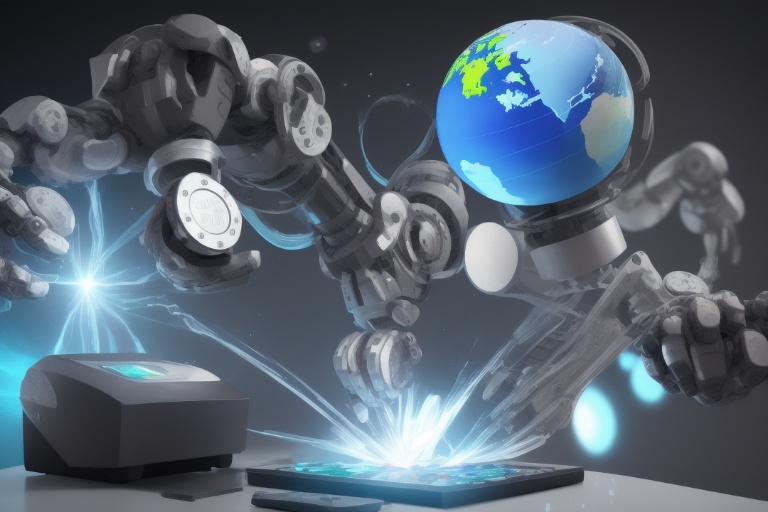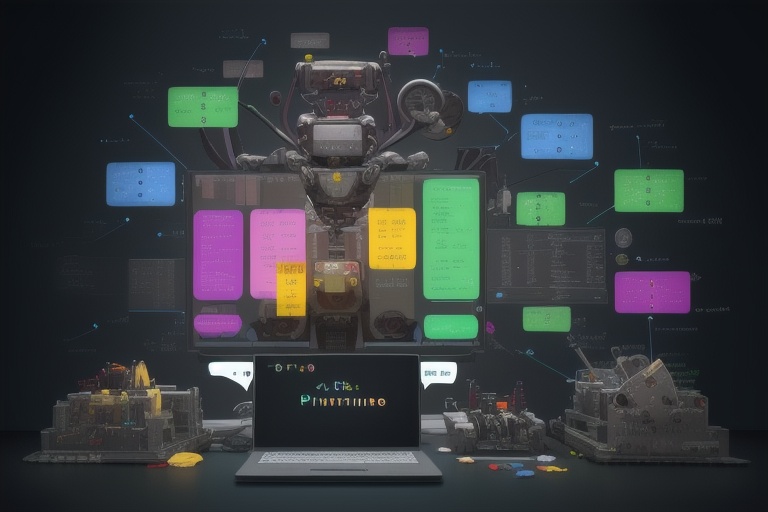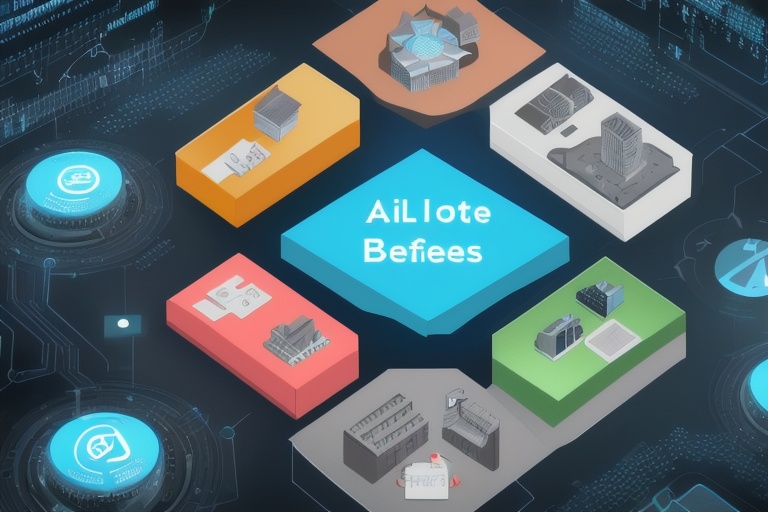
- Details
- By:
- Category: Machine Learning
Smartphones: Multifaceted Wonders in Your Pocket

- Details
- By:
- Category: Machine Learning
Artificial intelligence (AI) is profoundly transforming diverse sectors, with its applications seeming virtually boundless. Its implications for enhancing efficiency and slashing costs have been readily adopted across numerous businesses worldwide. Yet, the significance of AI doesn't stop at private enterprises; governments globally are now leveraging AI to revamp public services and sharpen their decision-making processes. This article aims to unpack some of the most compelling applications of AI within the government sector. But let’s first demystify AI and discuss its necessity in governance.

- Details
- By:
- Category: Machine Learning
Artificial intelligence and machine learning are rapidly transforming our world, making the once-distant dream of intelligent machines a present reality. One of the most intriguing aspects of this technological evolution is the potential to create machines that not only think but feel—machines capable of emotion and perhaps even consciousness. This very concept is not only the fodder for intensive research but also a common theme in popular culture, most notably explored in Steven Spielberg's cinematic masterpiece, "A.I. Artificial Intelligence."

- Details
- By:
- Category: Machine Learning
Artificial intelligence (AI) has rapidly evolved from a niche scientific concept to a pivotal tool that is reshaping the way we live and work in profound ways. A report by Deloitte Insights reveals a staggering 61% of surveyed leaders anticipate that AI will significantly transform their industries within three to five years. This forward-thinking mindset underscores the increasing investment in AI technologies and skilled professionals across various sectors. Cutting through the buzz, it is vital to pause and consider the expansive potential and tangible impact of this revolutionary force.

- Details
- By:
- Category: Machine Learning
Artificial intelligence (AI) has made a remarkable impact across numerous industries, revolutionizing the ways we live and work. At the heart of this revolution is the goal of enhancing efficiency, expanding reach, and delivering a wider array of products and services. As AI continues to be at the forefront of technological evolution, it's exemplified by bold moves such as Microsoft's substantial investment in OpenAI, creators of the groundbreaking ChatGPT. This pace of development, while impressive, also ushers in a host of risks that must not be overlooked.

- Details
- By:
- Category: Machine Learning
Artificial intelligence (AI) is increasingly becoming a focal point in conversations about the future landscape of our economy and society. With the swift progress in robotics and AI technologies, there is a tangible sense of apprehension about the possibility of human labor being sidelined and the repercussions that might follow. Despite some economists' contention that technological evolution does not necessarily result in long-term joblessness, the deeper integration of AI into our daily routines has sparked alarm regarding the relevance of human work and the prospect of an economic upheaval.

- Details
- By:
- Category: Machine Learning
Artificial intelligence (AI) is set to redefine the agricultural industry as the world's population moves towards an estimated 10 billion by the middle of this century. With an urgent need to increase crop production and maximize yields, AI presents a suite of solutions that could revolutionize traditional farming practices, helping to overcome existing limitations and enhancing overall productivity. Having been a cornerstone of human civilization, agriculture's importance to economic development and sustenance cannot be overstated. In this light, the infusion of AI across various sectors has been particularly pronounced, and agriculture stands at the forefront of this technological leap.

- Details
- By:
- Category: Machine Learning
Artificial Intelligence (AI) stands at the forefront of technological evolution, shaping not just the future but the present in every imaginable sector. Often defined by its capacity for cognitive functions – such as learning from experiences and problem-solving – AI’s influence reaches far beyond simple automation. By integrating techniques from Machine Learning (ML) and Deep Learning, AI systems are capable of mimicking human behavior, processing complex data, and making predictions with remarkable accuracy. The rapid growth in AI is not just a subject of academic interest but a palpable revolution across industries.

- Details
- By:
- Category: Machine Learning
Artificial intelligence (AI) and machine learning (ML) have become synonymous with the cutting edge of technological progress. These fields are heralds of a new era, reshaping the way we live, work, and interact with the digital realm. The driving force behind AI and ML is programming, the indispensable skill set that allows developers to create diverse and innovative software, design user-friendly interfaces, and construct intricate algorithms that empower intelligent systems. In this exploration of AI and machine learning trends, we'll delve deep into the potential, advancements, and real-world applications that are altering the landscape of numerous industries.

- Details
- By:
- Category: Machine Learning
The technological landscape is constantly evolving, with artificial intelligence (AI) and machine learning (ML) sitting at the forefront of innovation. However, these terms are often used interchangeably and, as a result, can lead to confusion. The key to unlocking the potential of these fields lies in understanding the core concepts and how they differ from each other: algorithms, machine learning, and artificial intelligence.

- Details
- By:
- Category: Machine Learning
The age we live in has been significantly transformed by the surge in processing power that stems from the continuous fading echoes of Moore's law. This catalyst has thrust artificial intelligence (AI) from the confines of research facilities to becoming an integral facet of our daily activities. With AI's rapid evolution, we have witnessed a slew of breakthroughs that have reshaped our reality: the emergence of refined voice assistants that can understand and reciprocate human speech, real-time translation systems breaking down language barriers, innovative healthcare systems designed for early diagnosis and prevention, and the advent of self-driving vehicles revolutionizing transportation.

- Details
- By:
- Category: Machine Learning
The realms of programming, artificial intelligence (AI), and machine learning (ML) are constantly in flux, fostering a demand for a well-rounded and accessible education in these sectors. To remain competitive and informed, a comprehensive course catalog is vital for learners and professionals alike. Despite the irritation that accompanies encountering a "Page Not Found" message while perusing for specific content, one must recognize the opportunity that arises from such an impasse. Facing a digital dead-end is not so much an endpoint as it is an invitation to explore alternative knowledge resources.

- Details
- By:
- Category: Machine Learning
Artificial intelligence (AI) has seamlessly woven itself into the fabric of our lives, influencing how we interact with technology on a daily basis. Whether it's through our interactions with voice assistants such as Siri or the finely tuned personal recommendations we receive on our favorite streaming platforms, AI's pervasiveness is undeniable. Its impact is particularly profound within the realm of national defense, where its potential is viewed as nothing short of transformational.

- Details
- By:
- Category: Machine Learning
The evolution of artificial intelligence (AI) from a staple of science fiction to a core aspect of modern technology is nothing short of remarkable. Today, AI shapes how we communicate, work, and even make decisions, transforming mundane tasks and creating personalized experiences. This exciting and ever-growing field has led to an upsurge in job opportunities, making it an opportune time to consider a career in AI. AI bootcamps have emerged as effective pathways to not only enter but also to thrive in this burgeoning industry.

- Details
- By:
- Category: Machine Learning
Artificial intelligence (AI) is ushering in a wave of change across various sectors, and the legal industry is riding at the forefront of this tech revolution. At the heart of this transformation lies the development of sophisticated computational models that can interpret legal knowledge, navigate complex reasoning, and even assist in decision-making. These advanced AI systems are not only augmenting the capabilities of legal professionals but also propelling discussions around the ethical and societal repercussions of their deployment.

- Details
- By:
- Category: Machine Learning
Navigating the investment landscape can be challenging, especially when you're deciding where to place your hard-earned money. Within the diverse world of financial markets, mutual funds and exchange-traded funds (ETFs) stand out as two of the most accessible and popular investment vehicles for individuals keen on wealth growth and diversification. As these instruments offer unique opportunities for investors, it's crucial to understand the distinguishing features that set them apart.

- Details
- By:
- Category: Machine Learning
The emergence of artificial intelligence (AI) has brought about a revolution in the way we create and interact with visual content. In recent years, AI art generators have captured the imagination of many, transforming simple text prompts into stunning visual artworks that both captivate and intrigue. These technological marvels have rapidly evolved from being exclusive tools in closed beta to becoming widely accessible and omnipresent in the digital art space.

- Details
- By:
- Category: Machine Learning
The evolution of technology continues to redefine the landscape of industries far and wide. Artificial intelligence (AI) and machine learning (ML) have paved the way for remarkable transformations, presenting businesses with unprecedented opportunities to surge past the competition. From sophisticated analytics to advanced automation, these technologies provide the toolkit necessary to extract valuable insights from the colossal assemblage of data—and to do so with a balance of speed, cost-efficiency, and superior quality. These insights result in tangible business value and drive measurable outcomes.



